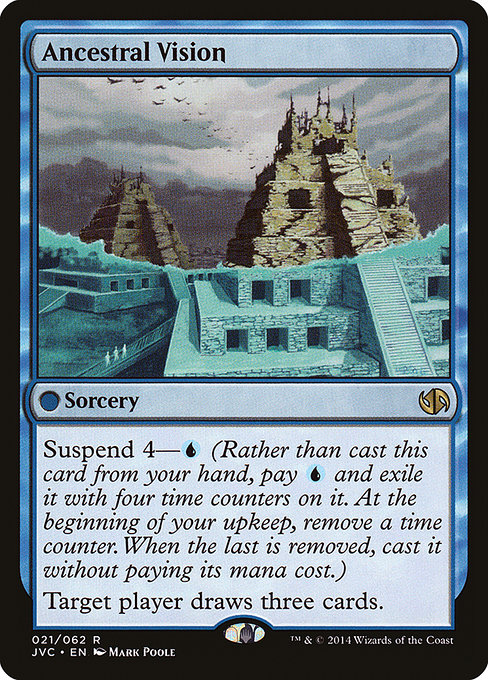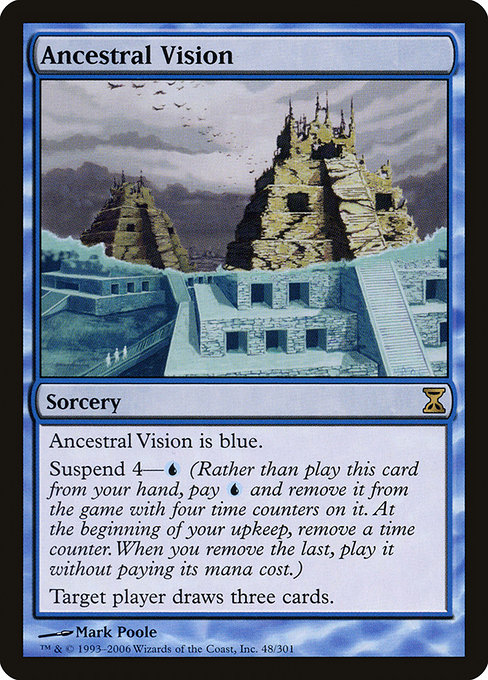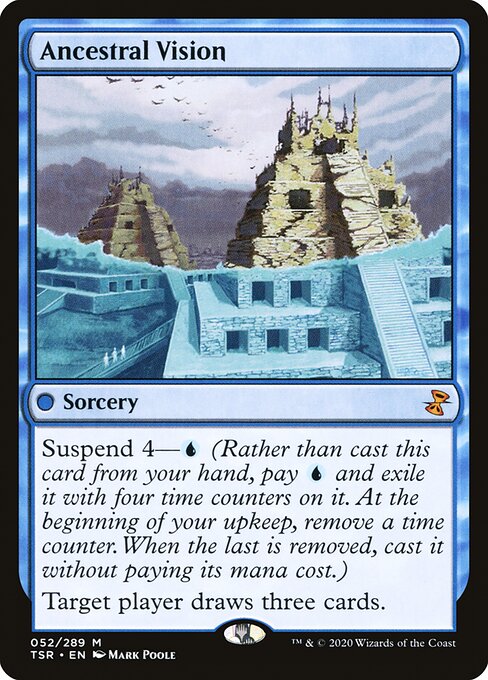Visión ancestral
Conjuro
Suspender 4—. (En lugar de lanzar esta carta de tu mano, puedes pagar y exiliarla con cuatro contadores de tiempo sobre ella. Al comienzo de tu mantenimiento, remueve un contador de tiempo. Cuando remuevas el último, lánzala sin pagar su coste de maná.)
El jugador objetivo roba tres cartas.
El jugador objetivo roba tres cartas.
standard
future
historic
gladiator
pioneer
explorer
modern
legacy
pauper
vintage
penny
commander
brawl
alchemy
paupercommander
duel
oldschool
premodern
Rulings
Although originally printed with a characteristic-defining ability that defined its color, this card now has a color indicator. This color indicator can’t be affected by text-changing effects (such as the one created by Crystal Spray), although color-changing effects can still overwrite it.
If the first triggered ability of suspend (the one that removes time counters) is countered, no time counter is removed. The ability will trigger again at the beginning of the card’s owner’s next upkeep.
If you can’t cast the card, perhaps because there are no legal targets available, it remains exiled with no time counters on it, and it’s no longer suspended.
Suspend is a keyword that represents three abilities. The first is a static ability that allows you to exile the card from your hand with the specified number of time counters (the number before the dash) on it by paying its suspend cost (listed after the dash). The second is a triggered ability that removes a time counter from the suspended card at the beginning of each of your upkeeps. The third is a triggered ability that causes you to cast the card when the last time counter is removed. If you cast a creature spell this way, it gains haste until you lose control of that creature (or, in rare cases, you lose control of the creature spell while it’s on the stack).
When the last time counter is removed, the second triggered ability of suspend (the one that lets you cast the card) triggers. It doesn’t matter why the last time counter was removed or what effect removed it.
If the spell requires any targets, those targets are chosen when the spell is finally cast, not when it’s exiled.
A card with no mana cost can’t be cast normally; you’ll need a way to cast it for an alternative cost or without paying its mana cost, such as by suspending it.
Cards exiled with suspend are exiled face up.
Exiling a card with suspend isn’t casting that card. This action doesn’t use the stack and can’t be responded to.
You are never forced to activate mana abilities to pay costs, so if there is a mandatory additional mana cost (such as from Thalia, Guardian of Thraben), you can decline to activate mana abilities to pay for it and hence fail to cast the suspended card, leaving it in exile.
You can exile a card in your hand using suspend any time you could cast that card. Consider its card type, any effects that modify when you could cast it (such as flash) and any other effects that stop you from casting it (such as from Meddling Mage’s ability) to determine if and when you can do this. Whether you could actually complete all steps in casting the card is irrelevant. For example, you can exile a card with suspend that has no mana cost or that requires a target even if no legal targets are available at that time.
If the card has in its mana cost, you must choose 0 as the value of X when casting it without paying its mana cost.
If the second triggered ability is countered, the card can’t be cast. It remains exiled with no time counters on it, and it’s no longer suspended.
If an effect refers to a “suspended card,” that means a card that (1) has suspend, (2) is in exile, and (3) has one or more time counters on it.
If a card with no mana cost is given an alternative cost equal to its mana cost (by Snapcaster Mage, for example), that cost cannot be paid and the card cannot be cast this way.
As the second triggered ability resolves, you must cast the card if able. You must do so even if it requires targets and the only legal targets are ones that you really don’t want to target. Timing permissions based on the card’s type are ignored.
The mana value of a spell cast without paying its mana cost is determined by its mana cost, even though that cost wasn’t paid.
If you cast a card “without paying its mana cost,” such as with suspend, you can’t choose to cast it for any alternative costs. You can, however, pay additional costs. If the card has any mandatory additional costs, you must pay those if you want to cast the card.
If the first triggered ability of suspend (the one that removes time counters) is countered, no time counter is removed. The ability will trigger again at the beginning of the card’s owner’s next upkeep.
If you can’t cast the card, perhaps because there are no legal targets available, it remains exiled with no time counters on it, and it’s no longer suspended.
Suspend is a keyword that represents three abilities. The first is a static ability that allows you to exile the card from your hand with the specified number of time counters (the number before the dash) on it by paying its suspend cost (listed after the dash). The second is a triggered ability that removes a time counter from the suspended card at the beginning of each of your upkeeps. The third is a triggered ability that causes you to cast the card when the last time counter is removed. If you cast a creature spell this way, it gains haste until you lose control of that creature (or, in rare cases, you lose control of the creature spell while it’s on the stack).
When the last time counter is removed, the second triggered ability of suspend (the one that lets you cast the card) triggers. It doesn’t matter why the last time counter was removed or what effect removed it.
If the spell requires any targets, those targets are chosen when the spell is finally cast, not when it’s exiled.
A card with no mana cost can’t be cast normally; you’ll need a way to cast it for an alternative cost or without paying its mana cost, such as by suspending it.
Cards exiled with suspend are exiled face up.
Exiling a card with suspend isn’t casting that card. This action doesn’t use the stack and can’t be responded to.
You are never forced to activate mana abilities to pay costs, so if there is a mandatory additional mana cost (such as from Thalia, Guardian of Thraben), you can decline to activate mana abilities to pay for it and hence fail to cast the suspended card, leaving it in exile.
You can exile a card in your hand using suspend any time you could cast that card. Consider its card type, any effects that modify when you could cast it (such as flash) and any other effects that stop you from casting it (such as from Meddling Mage’s ability) to determine if and when you can do this. Whether you could actually complete all steps in casting the card is irrelevant. For example, you can exile a card with suspend that has no mana cost or that requires a target even if no legal targets are available at that time.
If the card has in its mana cost, you must choose 0 as the value of X when casting it without paying its mana cost.
If the second triggered ability is countered, the card can’t be cast. It remains exiled with no time counters on it, and it’s no longer suspended.
If an effect refers to a “suspended card,” that means a card that (1) has suspend, (2) is in exile, and (3) has one or more time counters on it.
If a card with no mana cost is given an alternative cost equal to its mana cost (by Snapcaster Mage, for example), that cost cannot be paid and the card cannot be cast this way.
As the second triggered ability resolves, you must cast the card if able. You must do so even if it requires targets and the only legal targets are ones that you really don’t want to target. Timing permissions based on the card’s type are ignored.
The mana value of a spell cast without paying its mana cost is determined by its mana cost, even though that cost wasn’t paid.
If you cast a card “without paying its mana cost,” such as with suspend, you can’t choose to cast it for any alternative costs. You can, however, pay additional costs. If the card has any mandatory additional costs, you must pay those if you want to cast the card.
Rulings
Although originally printed with a characteristic-defining ability that defined its color, this card now has a color indicator. This color indicator can’t be affected by text-changing effects (such as the one created by Crystal Spray), although color-changing effects can still overwrite it.
If the first triggered ability of suspend (the one that removes time counters) is countered, no time counter is removed. The ability will trigger again at the beginning of the card’s owner’s next upkeep.
If you can’t cast the card, perhaps because there are no legal targets available, it remains exiled with no time counters on it, and it’s no longer suspended.
Suspend is a keyword that represents three abilities. The first is a static ability that allows you to exile the card from your hand with the specified number of time counters (the number before the dash) on it by paying its suspend cost (listed after the dash). The second is a triggered ability that removes a time counter from the suspended card at the beginning of each of your upkeeps. The third is a triggered ability that causes you to cast the card when the last time counter is removed. If you cast a creature spell this way, it gains haste until you lose control of that creature (or, in rare cases, you lose control of the creature spell while it’s on the stack).
When the last time counter is removed, the second triggered ability of suspend (the one that lets you cast the card) triggers. It doesn’t matter why the last time counter was removed or what effect removed it.
If the spell requires any targets, those targets are chosen when the spell is finally cast, not when it’s exiled.
A card with no mana cost can’t be cast normally; you’ll need a way to cast it for an alternative cost or without paying its mana cost, such as by suspending it.
Cards exiled with suspend are exiled face up.
Exiling a card with suspend isn’t casting that card. This action doesn’t use the stack and can’t be responded to.
You are never forced to activate mana abilities to pay costs, so if there is a mandatory additional mana cost (such as from Thalia, Guardian of Thraben), you can decline to activate mana abilities to pay for it and hence fail to cast the suspended card, leaving it in exile.
You can exile a card in your hand using suspend any time you could cast that card. Consider its card type, any effects that modify when you could cast it (such as flash) and any other effects that stop you from casting it (such as from Meddling Mage’s ability) to determine if and when you can do this. Whether you could actually complete all steps in casting the card is irrelevant. For example, you can exile a card with suspend that has no mana cost or that requires a target even if no legal targets are available at that time.
If the card has in its mana cost, you must choose 0 as the value of X when casting it without paying its mana cost.
If the second triggered ability is countered, the card can’t be cast. It remains exiled with no time counters on it, and it’s no longer suspended.
If an effect refers to a “suspended card,” that means a card that (1) has suspend, (2) is in exile, and (3) has one or more time counters on it.
If a card with no mana cost is given an alternative cost equal to its mana cost (by Snapcaster Mage, for example), that cost cannot be paid and the card cannot be cast this way.
As the second triggered ability resolves, you must cast the card if able. You must do so even if it requires targets and the only legal targets are ones that you really don’t want to target. Timing permissions based on the card’s type are ignored.
The mana value of a spell cast without paying its mana cost is determined by its mana cost, even though that cost wasn’t paid.
If you cast a card “without paying its mana cost,” such as with suspend, you can’t choose to cast it for any alternative costs. You can, however, pay additional costs. If the card has any mandatory additional costs, you must pay those if you want to cast the card.
If the first triggered ability of suspend (the one that removes time counters) is countered, no time counter is removed. The ability will trigger again at the beginning of the card’s owner’s next upkeep.
If you can’t cast the card, perhaps because there are no legal targets available, it remains exiled with no time counters on it, and it’s no longer suspended.
Suspend is a keyword that represents three abilities. The first is a static ability that allows you to exile the card from your hand with the specified number of time counters (the number before the dash) on it by paying its suspend cost (listed after the dash). The second is a triggered ability that removes a time counter from the suspended card at the beginning of each of your upkeeps. The third is a triggered ability that causes you to cast the card when the last time counter is removed. If you cast a creature spell this way, it gains haste until you lose control of that creature (or, in rare cases, you lose control of the creature spell while it’s on the stack).
When the last time counter is removed, the second triggered ability of suspend (the one that lets you cast the card) triggers. It doesn’t matter why the last time counter was removed or what effect removed it.
If the spell requires any targets, those targets are chosen when the spell is finally cast, not when it’s exiled.
A card with no mana cost can’t be cast normally; you’ll need a way to cast it for an alternative cost or without paying its mana cost, such as by suspending it.
Cards exiled with suspend are exiled face up.
Exiling a card with suspend isn’t casting that card. This action doesn’t use the stack and can’t be responded to.
You are never forced to activate mana abilities to pay costs, so if there is a mandatory additional mana cost (such as from Thalia, Guardian of Thraben), you can decline to activate mana abilities to pay for it and hence fail to cast the suspended card, leaving it in exile.
You can exile a card in your hand using suspend any time you could cast that card. Consider its card type, any effects that modify when you could cast it (such as flash) and any other effects that stop you from casting it (such as from Meddling Mage’s ability) to determine if and when you can do this. Whether you could actually complete all steps in casting the card is irrelevant. For example, you can exile a card with suspend that has no mana cost or that requires a target even if no legal targets are available at that time.
If the card has in its mana cost, you must choose 0 as the value of X when casting it without paying its mana cost.
If the second triggered ability is countered, the card can’t be cast. It remains exiled with no time counters on it, and it’s no longer suspended.
If an effect refers to a “suspended card,” that means a card that (1) has suspend, (2) is in exile, and (3) has one or more time counters on it.
If a card with no mana cost is given an alternative cost equal to its mana cost (by Snapcaster Mage, for example), that cost cannot be paid and the card cannot be cast this way.
As the second triggered ability resolves, you must cast the card if able. You must do so even if it requires targets and the only legal targets are ones that you really don’t want to target. Timing permissions based on the card’s type are ignored.
The mana value of a spell cast without paying its mana cost is determined by its mana cost, even though that cost wasn’t paid.
If you cast a card “without paying its mana cost,” such as with suspend, you can’t choose to cast it for any alternative costs. You can, however, pay additional costs. If the card has any mandatory additional costs, you must pay those if you want to cast the card.
Your collection? Your decks?
Want to manage your collection and/or create decks?
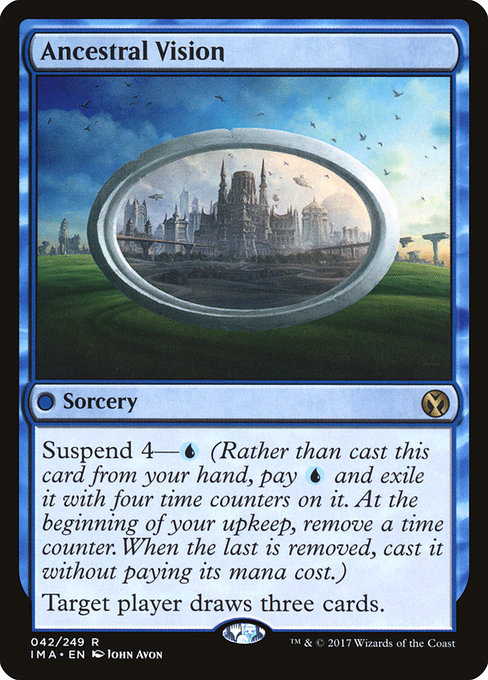

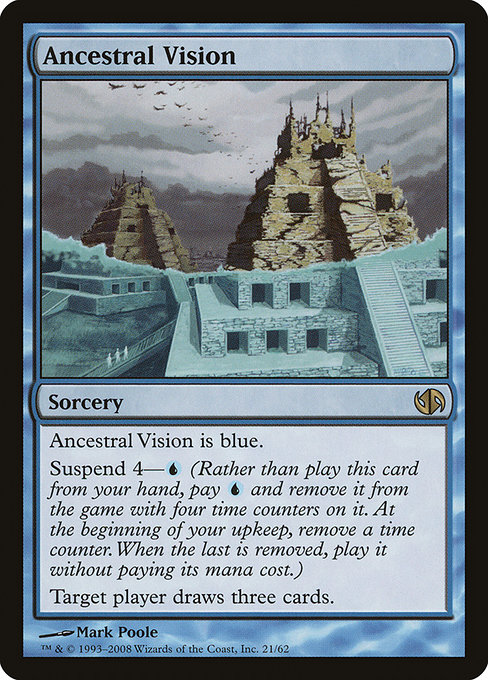
 0
0
 2.36€
2.36€
